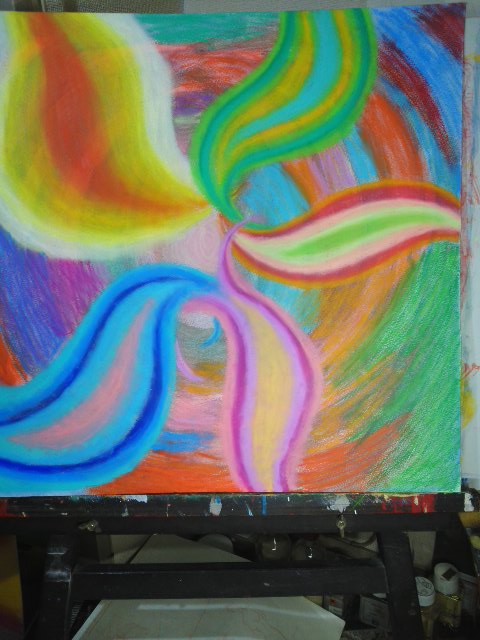(日本語は英語の下に)
Below on October 19, I showed you just the priming (undercoating) of this
new painting. Here is its Stage 1. The work continues.
The source of inspiration
It is inspired by Deuteronomy 8:3 of the Torah — “Humans shall not live
by bread alone but by ‘every thing/word that proceeds from’ the mouth
of YHWH”.
Commonly, this is translated like “— by ‘every word that proceeds
from’ the mouth of YHWH”. Yet the portion within the single quotation
marks is in the original Hebrew actually “kal mosa” — “every (thing) that
proceeds from”. So, the Hebrew does not say, at least explicitly, “word”.
Literally, “kal mosa” means “everything that proceeds from —“.
The Septuagint has “επι παντι ρηματι τω —” (by every word/utterance that —)
Maybe, this Septuagint translation affected most of the later translations.
As you probably have experienced, when this “kal mosa” is rendered
“every word”, people often take is as “God’s teachings, commandments, etc.”
and think of a two-storied human existence: “material = body and
moral, existential = word”. Then, there often are some people that complain,
“That’s a lovely teaching, but after all we cannot survive without bread.”
Yet if “kal mosa” is taken as “everything that proceeds from —“,
what are the things that come out of God’s mouth??
Since this “mouth of God” is itself a metaphor modeled after
human organs, let’s think of what comes out of our “mouth” —
Don’t say “burps and yawns”, please!
Yes, words, teachings, commandments, etc. do come from human mouths
as well. Yet what is the thing that comes out of a human mouth
most frequently?? Obviously, breath!!
So, if we take “kal mosa” as something that includes breaths as well,
the divine breath is what makes every living creature exist and live.
Once the breath of God leaves a person, no bread can ever help him/her.
Seen this way, Deuteronomy 8:3 is certainly not a goodie-clean teaching,
but a statement of an obvious truth.
Well, if you’d rather see the painting as a “queer flower” rather than
something explained above, you have all the right to do so.
“Kal Mosa”, Stage 1
Oil pastel on tempera on paper boqard
Work in progress
* To see my other paintings (finished ones),
just click an item on the black menu above!
下の10月19日、この新しい作品の地塗りだけを紹介しました。制作は、これから続きます。
インスピレーションの源泉
トーラー(日本では「旧約聖書」と呼んでいますが)の「申命記」8:3 が源泉です。
「人はパンだけで生きるのではなく、YHWH(主)の口から発するすべてのもの / 言葉
によって生きる」
通常、この箇所は「YHWHの口からでるすべての言葉によって ・・・」と翻訳されています。
でも「口から出るすべての言葉」と翻訳されている箇所は、元のヘブライ語では “kal mosa”
— “口から出るものすべて” です。つまり原語は、少なくても明示的には、「言葉」とは
言っていないのです。文字通りには、”kal mosa” は「・・・から出るすべてのもの」という
意味ですね。
紀元前2世紀にトーラーなどをヘブライ語からギリシャ語に翻訳した「70人訳」という
翻訳では、 “επι παντι ρηματι τω —” (・・・から出るすべての言葉 / 教え) と翻訳してあります。
ことによると、この70人訳の翻訳が、それ以降のほとんどの翻訳に影響したのかも。
皆様の多くも体験されたと思いますが、この “kal mosa” を「すべての言葉」と
理解すると、多くの読者は「神の教え、命令など」と理解し、人間のことを
「物質的な身体と、倫理・道徳的な言葉」という二階構造で考えます。そして
一部の皆さんは、すぐに文句を仰います: 「そいつはきれいな教えだけど、結局は
だれも、パンがなけりゃ生きられないじゃないか!」
でも、 “kal mosa” を「神の口から出るすべてのもの」と理解すれば、
いったい「口から出るもの」とは、何でしょうか?
この「神の口」という表現そのものが、人体になぞらえた暗喩ですよね。
では、人の口から出るものとは?? 「げっぷとあくび」とか、いわないでね。。
ええ、確かに言葉や教え、命令も人の口から出てきます。
でも、口からもっとも頻繁に出てくるものって?
間違いなく、「息」ですよね。
つまり、 “kal mosa” を「息」も含むものと理解するなら、話が違ってきますよね。
「神の息」とは、すべての生命体を存在させ、活かすものです。
神の息が誰かを去ると、どんな「パン」も、その人を助けることはできませんよね。
こんなふうに考えると、「申命記」8:3 は「きれいごと」などではなく、
当たり前な事実を表現したものですね。
でもまあ、上述の様な思考をしているよりも、「単なる奇妙な花」として
この絵画をご覧になりたいのなら、それでも構いません。
“Kal Mosa”、ステージ1
イラストボードにテンペラとオイルパステル
制作進行中
* 私の作品(完成作)をご覧になるには、上の黒いメニューで
いずれかの項目をクリックなさってください。

